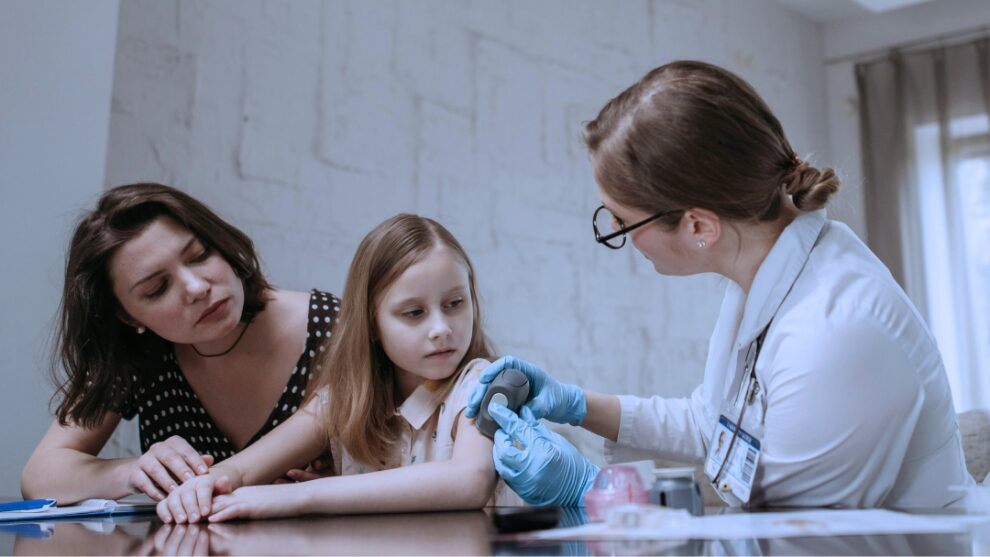
What happened?
On May 27th, 2025, Health and Human Services Secretary Robert F. Kennedy Jr., along with National Institutes of Health (NIH) Director Jay Bhattacharya and Food and Drug Administration (FDA) Commissioner Marty Makary announced that the Trump Administration had removed COVID-19 vaccines from the childhood immunization schedule and from the recommended schedule for pregnant women.
Earlier in May, Makary and FDA’s director of the Center for Biologics Evaluation and Research Vinayak Prasad released an FDA policy position restricting COVID-19 vaccines to adults 65 and older and those at high risk for severe COVID-19.
Combined, these actions will put children and their families at increased risk of COVID-19 and other health complications as COVID-19 vaccines become more difficult and more expensive to get.
The weak and misleading “evidence” provided by Kennedy and others in the Trump Administration does not make a sufficient case for withholding COVID-19 vaccines from children. Research continues to show that the benefits of vaccinating children far outweigh the few risks. With this position, Kennedy and others — none of whom are trained in infectious diseases or vaccinology — unnecessarily put America’s children at increased risk for COVID-19, long COVID, Multisystem Inflammatory Syndrome (MIS-C), and other other complications.
What is the immediate effect of this position?
This measure eliminates the recommendation that children receive at least one dose of the most current COVID-19 vaccine after 6 months of age. At the same time, FDA plans to require unnecessarily and unusually strict testing for already approved COVID-19 vaccines for people aged 6 months to 64 years with no other risk factors for severe COVID-19.
Together, these actions mean that many children will go unvaccinated and that insurance companies may no longer cover the vaccine, which costs roughly $140 per vaccine. In addition, even families who can afford the vaccine may not be able to get it without a prescription from a doctor. These obstacles to protecting children come at the same time Congress and the Administration are attacking Medicaid, which provides health insurance to 37 million children.
In addition, the use of weak, false, and purposefully misleading evidence contributes exponentially to existing vaccine hesitancy and works to further destroy public trust in vital public health agencies, such as the FDA and the Centers for Disease Control and Prevention (CDC).
What could happen next?
Now that Secretary Kennedy has removed the COVID-19 vaccine from the CDC’s childhood vaccine schedule, he may instruct the FDA to revoke the Emergency Use Authorizations (EUAs) for the pediatric COVID-19 vaccines altogether. If the EUAs are revoked, COVID-19 vaccines may become unavailable for children while vaccine manufacturers attempt to get the vaccines re-approved by the FDA. These actions would make it essentially impossible for children to obtain vaccines against COVID-19 in the United States.
Not Recommended vs. No Access: Twisting the research to fit the policy
Kennedy and others have repeatedly claimed that “most countries have stopped recommending [the COVID-19 vaccine] for children” and “all other high-income nations confine vaccine recommendations to older adults (typically those older than 65 years of age), or those at high risk for severe Covid-19.” But this is a disingenuous reading of these policies. In fact, “most countries” — which appears to mean the 12 countries identified in the FDA’s position paper on the issue — do continue to recommend an initial COVID-19 vaccine for all people, of all ages, including babies and children. They have, however, cut back on recommending yearly boosters for children. It is obvious the Administration understands this distinction because it is clearly stated in the documents they offer as evidence. It is purposefully misleading then to produce this list as evidence to limit all vaccination for persons under 65 and without risk factors for severe COVID-19.
The 12 countries that the FDA lists derived their booster recommendations from the World Health Organization’s (WHO) COVID-19 vaccine guidance, which states that all persons should receive at least one dose of the COVID-19 vaccine in their lifetime and that previously vaccinated persons as young as 50 years old with comorbidities, pregnant persons, health workers, and individuals with compromised immune systems or increased risk factors for severe COVID-19 should receive additional doses of the vaccine routinely, either per pregnancy or every six to 12 months.

By removing COVID-19 vaccines from the childhood immunization schedule and placing other restrictions on them, Kennedy effectively prevents children and their families from accessing the vaccines at all, which is fundamentally at odds with WHO’s guidance that “everyone, everywhere should have access to COVID-19 vaccines.” Even though FDA’s Prasad and Makary have said they reject the view that “the American people are not sophisticated enough to understand age- and risk-based recommendations,” they apparently accept the idea that American children should not be protected from COVID-19 and that American families should not even be allowed to choose whether they want additional yearly protection.
Everyone, everywhere, should have access to COVID-19 vaccines.
World Health Organization Guidance
No vaccines means higher risk to children
If children and their families are no longer able to be vaccinated against COVID-19 they risk COVID-19 infection, long COVID, and MIS-C. The latest COVID-19 variant, Omicron, has an R0 value of 9.5, meaning one person infected with COVID-19 is expected to infect between nine and 10 other people. This rating means COVID-19 is nearly nine times more infectious than flu and would require 89% of the U.S. population to achieve herd immunity, a form of indirect protection where enough people in the U.S. are immune to a given disease that it makes the disease harder to transmit. Herd Immunity is the only way to protect unvaccinated people in the U.S., especially those who cannot receive the vaccine due to compromised immune systems, allergies, or other complications. By Prasad and Makary’s own admission, only 30-60% of Americans would be eligible to access the COVID-19 vaccine, far below herd immunity and thus jeopardizing the health of millions of Americans. Unvaccinated children and their families could face various risks, including:
- Increased risk of COVID-19
- Without access to vaccines, children are at increased risk of COVID-19 infection.
- From 2020 to 2022, COVID-19 was the 7th leading cause of death for 1-17 year olds in America, killing an estimated 1086 children. Although they have a lower risk of severe illness and hospitalization, children are just as likely as adults to be infected. Children also can spread the virus and, in some studies, have been shown to play an outsized role in spreading COVID-19.
- Babies under 1 year old, especially those prematurely born, are at heightened risk of severe illness. The only way for babies under 6 months old to be protected from COVID-19 is for their families and those around them to be vaccinated, especially their pregnant parent. WHO thus recommends that pregnant persons receive another dose of the COVID-19 vaccine during their pregnancy, which the FDA’s framework does not allow and CDC no longer recommends.
- Newborns are protected through transferred immunity from their pregnant parent getting vaccinated, which is why pregnant people are advised to get flu shots, TDAP vaccines, and other vaccines to protect the health of newborns.
- Increased risk of long COVID
- Even if children recover from a COVID-19 infection that caused mild or no symptoms, they are still at risk of long COVID, also calledpost-COVID condition or PCC. Long COVID is a condition that continues to cause symptoms even after the person recovers from the COVID-19 infection. Long COVID can last anywhere from 3 months to many years. Researchers have identified up to 200 symptoms of long COVID, notably fatigue, brain fog, and anxiety, and long COVID can negatively affect a child’s ability to play or perform well at school. There is no cure for long COVID, so vaccines remain the best way to protect children from the condition. Currently, over 1 million children in the U.S. have had long COVID, with 80% experiencing activity limitations.
- Increased risk of MIS-C
- Multisystem Inflammatory Syndrome in children (MIS-C), is a rare but serious condition that can affect children infected with COVID-19. A child with MIS-C may have a fever and severe inflammation in multiple parts of their body, including their heart, lungs, and brain. The only way to protect against MIS-C is to be vaccinated against COVID-19. Many things remain unknown about MIS-C, but experts have observed that it can affect children of all ages, and especially school-age children around 8 to 9 years old. MIS-C can be treated if detected early enough, but without treatment children can suffer permanent damage to the heart, kidneys, and other organs.
- Becoming incubators for deadlier and more infectious strains of COVID-19
- Every time a virus infects someone it replicates and has a chance to mutate, making it easier to spread from person to person and/or deadlier. For example, on the same day as Secretary Kennedy’s announcement, researchers detected a new strain of COVID, variant NB.1.8.1, in the U.S. The more a virus is allowed to spread, the more chances it has to mutate.
- As COVID-19 has mutated, it has become exponentially better at spreading from person to person. If we refuse to protect children in the U.S. and let more and more children and families go unvaccinated, we allow COVID-19 to spread and mutate into more infectious and deadlier variants.
- Kennedy’s disinformation campaign makes vaccine hesitancy worse
- Even if these dangerous policies are eventually reversed, the damage to the public’s confidence in public health agencies like the CDC and FDA may be longer lasting. The disinformation and false claims about the safety and effectiveness of COVID-19 vaccines by Kennedy and others can make hesitancy around the COVID-19 vaccines and other vaccines much worse.
- Prasad and Makary mention public trust in vaccination has declined, referencing an article that explicitly refutes Secretary Kennedy’s false vaccine claims and blames the Trump Administration for fueling anti-vaccine sentiment. Prasad and Makary make the bewildering claim that COVID-19 vaccination requirements, not their or Secretary Kennedy’s years of anti-vaccine disinformation, is the cause for lower vaccination rates in the U.S. The truth is much more straightforward: disinformation is the number one driver of COVID-19 vaccine hesitancy as well as hesitancy to take a variety of other vaccines.
- COVID-19 vaccines are safe and effective. The benefits for getting vaccinated far outweigh the risk of side effects.
Conclusion
Secretary Kennedy’s decision to remove COVID-19 vaccines from the childhood immunization schedule, in combination with the FDA’s decision to restrict access to the latest COVID-19 vaccines, is anti-scientific, short-sighted, and will put children and their families at unnecessary risk while potentially letting COVID-19 mutate and run wild in the U.S. COVID-19 vaccines are safe, effective, and lifesaving, and these decisions will make it essentially impossible for most people in the United States to be protected from COVID-19. This decision will also further erode public trust in vaccines and public health institutions at the same time that outbreaks of vaccine-preventable diseases, like measles, continue to ravage the country. Instead of accepting scientific consensus, agreeing with what other countries and WHO actually recommend, or trusting parents and doctors to make informed decisions about children’s health, Secretary Kennedy has unilaterally imposed his own false anti-vaccine rhetoric onto America’s children. American children and their families will suffer decades of lasting harm if these decisions stand.
